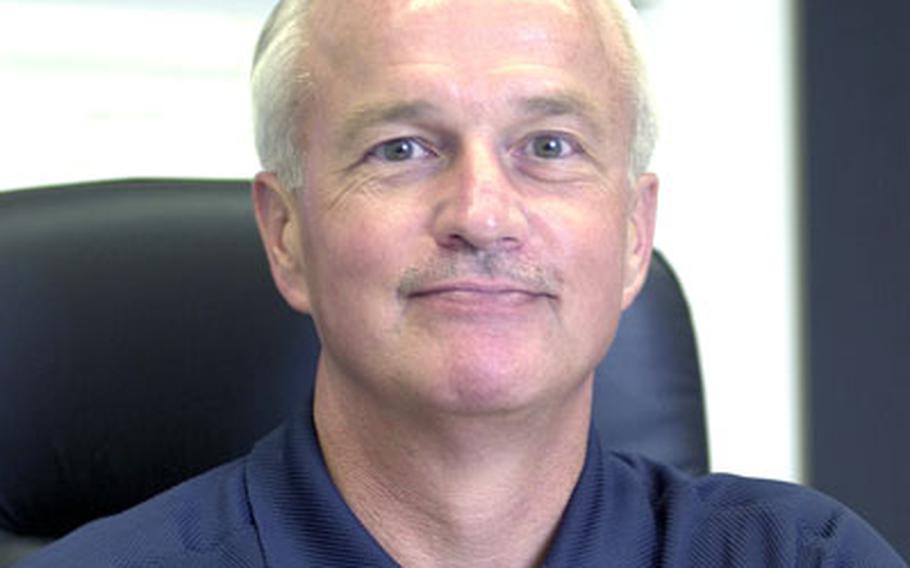
Department of Defense Dependents Schools-Pacific Far East Activities Council chair Don Hobbs is hoping a Far East playoff will induce less turnover and transfers for Pacific high school football programs. “It will create more excitement, I think it will do wonders,” he said. (Dave Ornauer / S&S)
TORII STATION, Okinawa — He’s perhaps overseen more change in the past two years, since he took the Far East Activities Council chair, than he had in his previous 19 years as a Department of Defense Dependents Schools-Pacific teacher, coach and part-time tournament organizer.
But perhaps the biggest change, and the one that Don Hobbs says has him highly optimistic, is a DODDS-Pacificwide football playoff that begins in two months.
“It will create more excitement. I think it will do wonders,” Hobbs said last Thursday during an interview at DODDS-Pacific’s regional headquarters on Torii Station.
The move completes DODDS-Pacific high school football’s evolution from a purely regional sport to a rainbow with a pot of gold at the end.
DODDS-Pacific’s football-playing schools will be segregated by enrollment, as is the case in Far East volleyball, soccer and basketball tournaments, with 360 being the enrollment demarcation line.
Robert D. Edgren of Japan will travel to either Taegu American or Osan American in South Korea to decide the Class A title on Nov. 5. In Class AA , the Japan Football League champion visits Seoul American, and the Okinawa Activities Council winner travels to Guam High for semifinals on Nov. 5. The winners will play for the championship at the site of the Okinawa-Guam winner on Nov. 12.
“They’ll all have something to shoot for. Coaches and players will have a common goal, which is to make those playoffs,” Hobbs said.
“Especially if there’s anything that resembles parity in Japan or Okinawa, coaches might say, ‘If we get one or two more players in, if we continue to work hard in the offseason, hit the weight room, get in better shape,’ then a coach might be less apt to transfer out, maybe they’d want to stay with the program and develop it.”
The playoff doesn’t come without complications, the biggest one being travel. That’s a major concern to the JFL’s three Class AA schools, who won’t know until the week before the playoffs who will travel to Seoul, and for Seoul American, which if it wins the semifinal has to arrange travel to either Okinawa or Guam quickly.
The playoff’s first year definitely will be the subject of a self-study, Hobbs said, “of what transpired, and we’ll ask for input from the different schools for any ideas or suggestions to improve it.”
Hobbs said he’s also preparing for a motion to have baseball and girls softball follow in football’s footsteps at the next FEAC meeting, scheduled for Oct. 24-25 on Okinawa.
DODDS-Pacific sponsors both sports in Japan, Okinawa and South Korea, with Okinawa having come on board this year after its program was co-sponsored by youth activities, the community and the DODDS-Okinawa district for the past three years.
“We’re going to have to acquire some background information, if there are enough schools that have baseball and softball as part of their athletic programs,” Hobbs said. “Then we’ll address the issue as it comes up.”
One problem in softball is that DODDS teams in South Korea and Okinawa play fastpitch, but Japan plans to retain the slowpitch format it’s used since 1997.
Far East tournaments in tennis, cross country and wrestling will remain DODDS-only events, Hobbs said.
Most coaches reacted favorably to the notion of DODDS-Pacific student-athletes “on the podium accepting the awards for DODDS-sponsored events,” Hobbs said.
Volleyball, long dominated by Tokyo-area international and Guam public and private schools, basketball and soccer will not move to a simliar format.
“We call all the DODDS schools together for tennis, cross country and wrestling,” Hobbs said. “You add the international schools and you have a larger number. When you divide volleyball, soccer and basketball into small and large schools, you can run tournaments where you can invite international schools. The logistics are more manageable.”
One change the small-schools tournament circuit will see is fewer moves of tournaments to different locales every couple of years.
“We try to rotate the host schools around every two years,” Hobbs said. “We aren’t as strict on small schools with the two-year rotation rule, because we have so few (five).”
All along the way, Hobbs and FEAC hope to keep aiming toward a goal of 100 percent participation by DODDS-Pacific students in at least one co-curricular activity.
“They know the role that co-curriculars play in the development of our youth,” Hobbs said. “If every school staff member would buy into that and come forward to volunteer to sponsor a co-curricular activity, some schools would realize some great changes in school spirit around campus.”